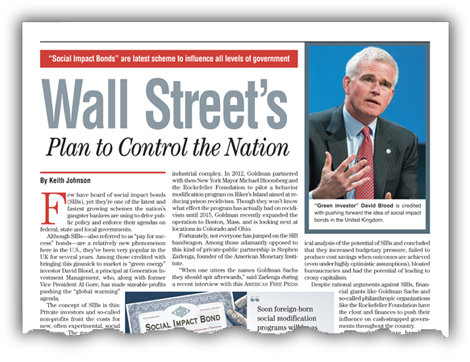
• “Social Impact Bonds” are latest scheme to influence all levels of government.
By Keith Johnson —
Few have heard of social impact bonds (SIBs), yet they’re one of the latest and fastest growing schemes the nation’s gangster bankers are using to drive public policy and enforce their agendas on federal, state and local governments.
Although SIBs—also referred to as “pay for success” bonds—are a relatively new phenomenon here in the United States, they’ve been very popular in the U.K. for several years. Among those credited with bringing this gimmick to market is “green energy” investor David Blood, a principal of Generation Investment Management, who, along with former Vice President Al Gore, have made sizeable profits pushing their “global warming” agenda.
The concept of SIBs is this: Private investors and so-called non-profits front the costs for new, often experimental, social programs. The government entity accepting those funds must have a matching amount set aside in their budget. If the program is not successful, the investor is out the money but can still write it off as a charitable donation. If the program performs well, not only is the government responsible for paying the investor back with taxpayer money, but must also fork over a bonus and any profits derived from the venture.
What’s worse, the vast majority of these privately-funded social programs are clearly designed to bring the U.S. in compliance with the globalist agenda: Developmental education for pre-schoolers, behavioral therapy for prisoners and birth control for teens are just a few of the social engineering programs that have already been implemented throughout the country.
Wall Street giant Goldman Sachs, which narrowly escaped criminal prosecution over its promotion of high-risk mortgages in 2008, is one of the largest U.S. investors in the SIB market.
Interestingly enough, this so-called too-big-to-jail megabank used this investment vehicle to tap into the lucrative prison-industrial complex. In 2012 they partnered with then-New York Mayor Michael Bloomberg and the Rockefeller Foundation to pilot a behavior modification program on Rikers Island aimed at reducing prison recidivism. Though they won’t know what effect the program has actually had on recidivism until 2015, Goldman recently expanded their operation to Boston, Massachusetts and is looking next at locations in Colorado and Ohio.
Fortunately, not everyone has jumped on the SIB bandwagon. Among those adamantly opposed to this kind of private-public partnership is Stephen Zarlenga, founder of the American Monetary Institute.
“When one utters the names Goldman Sachs they should spit afterwards,” said Zarlenga during a recent interview with this AMERICAN FREE PRESS reporter. “People should understand that banking is a sanctioned criminal enterprise. Anything they’re putting forward is against the public interest, whether it’s through influence [over] or privatization of public policy goals. It takes [power] from the people and delivers it to the banks, giving them one more special advantage in their ability to control society.”
Others have expressed similar concerns.
“The ability to drive outcomes, one could argue, are agendas set by the private companies investing the millions,” wrote Bill Bradley for “Next City.”
“It’s the same argument against charter schools: Are we privatizing education or simply leveraging private dollars in an attempt to implement programs that might not otherwise exist?”
The respected non-profit pro-business organization Committee for Economic Development (CED) has been relatively biased in favor of SIBs. However, CED recently acknowledged that “it’s a sure bet that lawsuits will emerge from social impact bonds in cases where investors disagree with how results were measured. These factors will amount to additional costs to taxpayers after all.”
Mark Fisher from the Maryland House of Delegates presented a critical analysis of the potential of SIBs and determined that they increased budgetary pressure, failed to produce cost savings when outcomes are achieved (even under highly optimistic assumptions), bloated bureaucracies and had the potential of leading to crony capitalism.
Despite rational arguments against SIBs, financial giants like Goldman and so-called philanthropic organizations like the Rockefeller Foundation have the clout and finances to push their influence on cash-strapped governments throughout the country.
Although they are breaking ground with social programs that can be perceived by many as beneficial to society, more insidious agendas are waiting in the wings. To find them, one need look no further than a Rockefeller Foundation report entitled “Accelerating Impact: Achievements, Challenges and What’s Next in Building the Impact Investing Industry,” where, in addition to SIBs, the foundation recommends investments in “Vaccine Bonds,” through which investors “provide upfront capital to stimulate the development of vaccines and research.”
They also push “Green Bonds,” championed by the World Bank, which “allow investors to support projects that mitigate climate change while generating a financial return.”
Like SIBs, all of these emerging programs were birthed and bred overseas. Soon they’ll be as prolific here as they are there, unless Americans step forward and put a stop to them once and for all.

Keith Johnson is a writer based in Tennessee. He can be contacted at [email protected].

